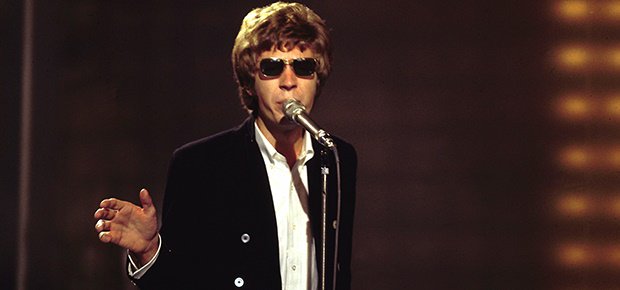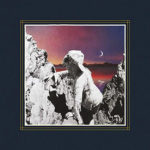When Mark Hollis of Talk Talk died in February earlier this year, most of the obituaries talked admiringly of his journey from top 40 to the avant-garde, and how he defied record company expectations to make art on nobody’s terms but his own. And if any artist paved the way for the likes of Hollis, it was surely Scott Walker, who passed away yesterday at the age of 76.
Oh, it’s raining today. Normally I relish writing articles about Scott for GIITTV, and have written several, but this is one piece I hoped never to have to write. I’m not going to write a traditional obituary and go over Walker’s journey from teen pop idol to uncompromising experimentalist; it’s been covered a million times and will be covered plenty more this week. So here is an obituary in six songs from six discrete Walker eras…
Love Her (1964)
‘Love Her’ was the Walker Brothers’ first UK hit, but even here you can hear intimations of what Scott would later become. Already well versed in Bergman & Camus by then, Walker took an old Everly Brothers B-side and turned it into a cinematic epic so brooding and wracked with regret it’s a miracle now that anyone ever thought they were a straightforward pop band. And when he sings “Be the guy that I couldn’t be”, it becomes more than a cover version and, in hindsight, maps out his place in 60s pop – or rather the fact that he felt he had no place in it at all.
Two Weeks Since You’ve Gone (1969)
1969’s Scott 3, his third solo album to hit the top 3 of the UK albums chart, was his first masterpiece, the culmination of three albums’ worth of increasingly complex orchestral pop and, as usual, a mix of his own songwriting, which was now almost fully developed, and covers of his biggest influence, Belgian singer Jacques Brel. ‘Two Weeks Since You’ve Gone’ is simply heartbreaking, the superficially smooth arrangement masking a song of utter devastation as Walker, either lovelorn or bereaved, wanders shellshocked through the city “like the tramp picking dustbins in the alley”. I can’t think of another lyric that better sums up the feeling of losing a loved one than “And if I close my eyes for a while, will you happen to me again?”
Ain’t No Sunshine (1973)
Yes, it’s THAT ‘Ain’t No Sunshine’, from one of Walker’s wilderness years covers albums. Following the commercial failure of the brilliant Scott IV, Walker slumped into creative torpor and began listening to his record company, who tried to turn him into a variety singer. The man himself may have disowned this particular period of his career but let’s face it, Walker would sound great singing ‘Baby Shark’, and that voice, on top of lush Isaac Hayes strings and porn soundtrack guitar, still sounds suave as fuck. But there’s no doubt that Walker’s frustration with being reduced to a cover act contributed to what came next.
The Electrician (1978)
The Walker Brothers’ mid-70s reunion may be best known for spawning slick-but-affecting AOR covers such as ‘No Regrets’ and ‘We’re All Alone’, but by the time of the third comeback album ‘Nite Flights’, Walker had assumed creative control and was starting to scare listeners with songs like ‘The Electrician’, a remarkable track that lurches from Bernard Hermann horror strings to a truly uplifting orchestral mid-section and then back again, Walker’s lyrics now the experimental, surreal cut-ups that would mark the rest of his career (“He’s drilling through the Spiritus Sanctus/Tonight through the dark hip falls/Screaming ‘Oh you mambos kill me’”) and the whole atmosphere having more in common with Bowie’s contemporaneous Berlin albums than the pop-country covers he’d been making a living from for the previous few years. File alongside 1984’s solo album Climate of Hunter as Walker’s first tentative steps away from mainstream pop and into the avant-garde.
Farmer in the City (1995)
Walker’s comeback after 11 years of silence, incredibly on a major label who clearly had no idea what they were getting into, was one of the most shocking records ever released, the sound of a man gleefully destroying his back catalogue and reputation. The album’s title was Tilt, surely a reference to Til the Band Comes In, Walker savagely shredding the title of a hated old album on a record that saw his once majestic baritone sounding haunted and desperate, orchestral strings violated by harsh percussion and electronic noise. And yet it also featured arguably his finest song, the breathtaking ‘Farmer in the City’, a masterpiece of restrained terror, on which Scott sheds his old skin before becoming something entirely different.
Epizootics! (2012)
By the time of 2012’s Bish Bosch, Walker had journeyed so far out his work bore virtually no resemblance to pop music whatsoever. His later work is surreal, disturbing, more percussive than melodic, often barely listenable. ‘Epizootics!’ is twisted bebop, a monstrous groove assaulted at regular intervals by demented orchestra and a disorientating electronic buzz, Scott gleefully singing about “choirs of pigs seeking revenge for stolen insulin”. He would go on to record the wonderful Soused with terrifying cowel-clad drone merchants Sunn 0))) on what would be his final studio album (not including soundtracks), and he never sounded happier than when he was scaring the living shit out of anyone expecting ‘The Sun Ain’t Gonna Shine Any More’.
Oh Scott, you wonderful genius you. You’ve comforted me, inspired me, depressed me and frightened me. You’ve had the most incredible career arc in popular music. You’ve spent the last 40 years doing exactly whatever you want and giving zero fucks about record sales or cultural trends. Words like ‘legend’ and ‘genius’ get bandied about with such ridiculous regularity these days that they have lost their value, but you were both. Rest in peace, and thank you.
Photo: Getty Images




